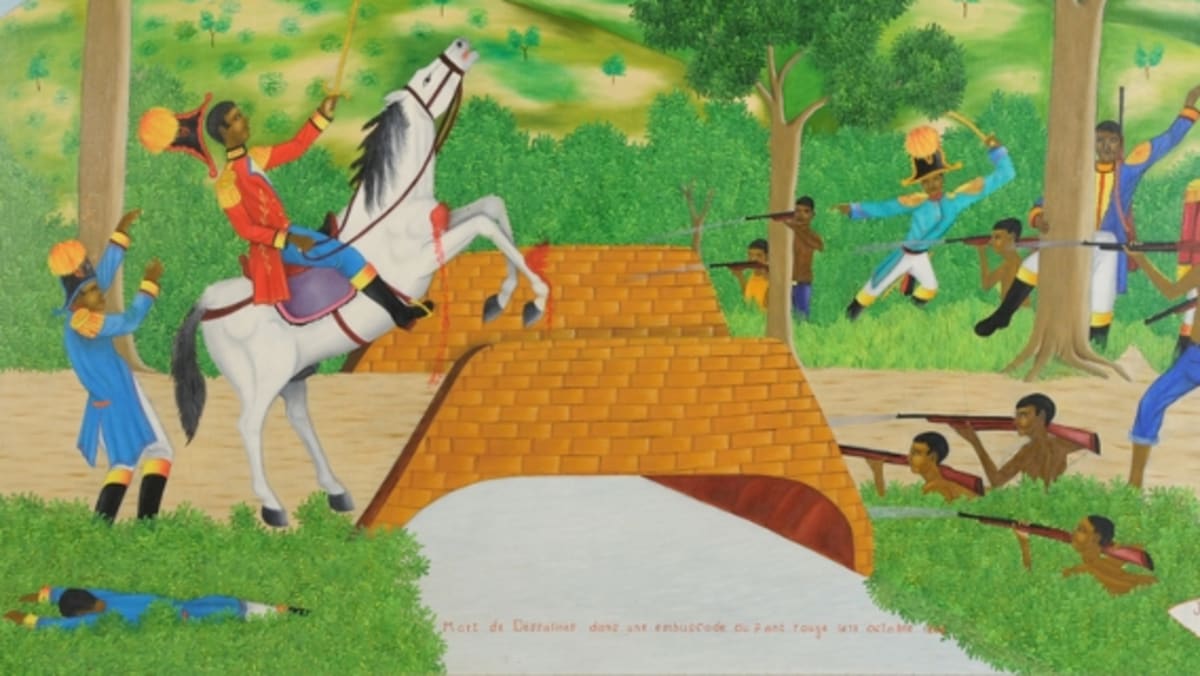By Marlene L. Daut
On this date we remember Haiti’s founder Jean-Jacques Dessalines, who was killed by members of his own army less than three years after becoming the first world leader in the Americas to permanently abolish slavery.
Below, I introduce you to two Haitian poets who, many decades following the assassination of Dessalines, and each in their own particular way, commemorated the death of Haiti’s first emperor.
In “The Red Bridge,” Coriolan Ardouin (December 11, 1812-July 12, 1835), who came from a family of illustrious writers, at once eulogizes, laments, and criticizes the Haitian revolutionary leader and founder of Haitian independence. Indeed, Ardouin’s poem implies that Jacques I’s death on Haiti’s Pont Rouge, just outside Port-au-Prince, occurred because the emperor had sought to rival God.
The Red Bridge (1881), by Coriolan Ardouin
I
This is where he fell, at the height of his power
He, whose mighty arm Independence did conquer!
What good were they to him, his name and reputation?
Under imperial foot he trampled all his glory,
And with his brothers’ blood he stained the history
Of our revolution!
Yet, he was beautiful, when with sword held up high,
He cried out: O sweet liberty, your day is coming nigh!
O how the deserts trembled with the roar of this lion
Sublime roar! Then throngs of slaves in pain
Turned warriors broke their chains
And armed themselves with their own irons!
II
The white man said: “Toussaint is dying!
“The eagle’s fallen in our nets!
“Impotent rage! Vainglorious ranting!
“Once more they will be our subjects!
“And we will laugh at their defeat,
“At their hope and their pride!
“Liberty was not at all meet
“For men of somber hide.”
III
Dessalines appeared sublime, grand and bold!
And hanged them himself at the loathsome scaffold
That their criminal hands for us had raised
How pitiful it seemed, their souls’ boundless terror
When we caught in women’s clothes, deathlike in their pallor
And their heads tumbling covered our roadways!
Oh, if then he meant to destroy his own work
If on the reefs he sailed and crashed his bark
And under a sorry shroud himself did bury
It is because darkness will always taint a bright sky,
Because the rolling waves, brown sands will always dye
Because pure glory belongs only to the Almighty.
****************************************************************
This next poem was written by Emmanuel Édouard (1858–91), a lawyer and poet from l’Anse-à-Veau, who famously spoke at the funeral of the French novelist and poet Victor Hugo. In his homage to the emperor of Haiti, preceded by two verses from Hugo, Édouard sings the praises of Dessalines, whose terrible fate Édouard had previously evoked in a letter to the Haitian general Jean-Baptiste Vignier: “From the newspapers of Haiti, I learned only a few days ago that you have restored Dessalines’s tomb, which, Oh, misery, was about to disappear!” Yet there is also tension in this poem, whose last lines evoke the equally tragic, but far different, death of Toussaint Louverture.
Speech to Be Pronounced Before the Statue of Jean-Jacques Dessalines, Liberator of Haiti, on the Day of His Inauguration (1884), by Emmanuel Édouard
For posterity, greatness absolves every man and every thing.—(V. Hugo).
The side of light hid the side of the darkness . . . ––(V. Hugo).
The soldier who founded our Independence
Could not wait in vain for his reward;
Certain that tomorrow would repair today,
After his superhuman toil, he slumbered calmly.
Since, for this crowd at last, the time has come
To remember what it should always have done,
Since, your moved and grateful country, at last,
Is here to consecrate your glorious name out of the past,
Oh, supreme worker, accept your salary!
Yesterday was sad and woeful, forget this misery!
O giant, under this sky, pure without a cloud,
Gloriously stand up, everlasting and proud.
May you, satisfied with these supreme honors,
Of so young a people absolve the blasphemous behavior!
As for your companions, these heroes so fearless,
Confident in their drive and in their righteousness,
Guided by the gleams of your dreadful steel,
The sublime and fearsome epic to feel
From which we emerged strong, upright, reborn,
To the most illustrious and to the humble, scorned,
To all, because all were magnificent,
Pious, we will construct identical monuments;
And then, in a very eminent, dignified location,
Above all of you, very high, towering over the nation
In his renown and his stature,
We will place that remarkable man, Louverture.
Original French from:
Coriolan Ardouin. “Le Pont rouge.” Poésies de Coriolan Ardouin, précédées d’une notice biographique par B. Ardouin. Port-au-Prince: R. Ethéart, 1881. 57–58.
Emmanuel F. Édouard. “Discours à prononcer devant la statue de Jean-Jacques Dessalines, libérateur d’Haïti, le jour de son inauguration.” Le Panthéon Haïtien. 2nd ed. Paris: Auguste Ghio, 1884.
Translations by: Marlene L. Daut and Grégory Pierrot, et al., and can be found in Haitian Revolutionary Fictions: Anthology (Charlottesville: University of Virginia Press, 2022).
To cite this article: Marlene L. Daut, "OTD in Haitian History (October 17, 1806): Assassination of Haiti’s Founder, Jean-Jacques Dessalines," King of Haiti's World Blog, October 17, 2025 <https://marlenedaut.com/blog/otd-in-haitian-history-october-17-1806-assassination-of-haiti-s>
